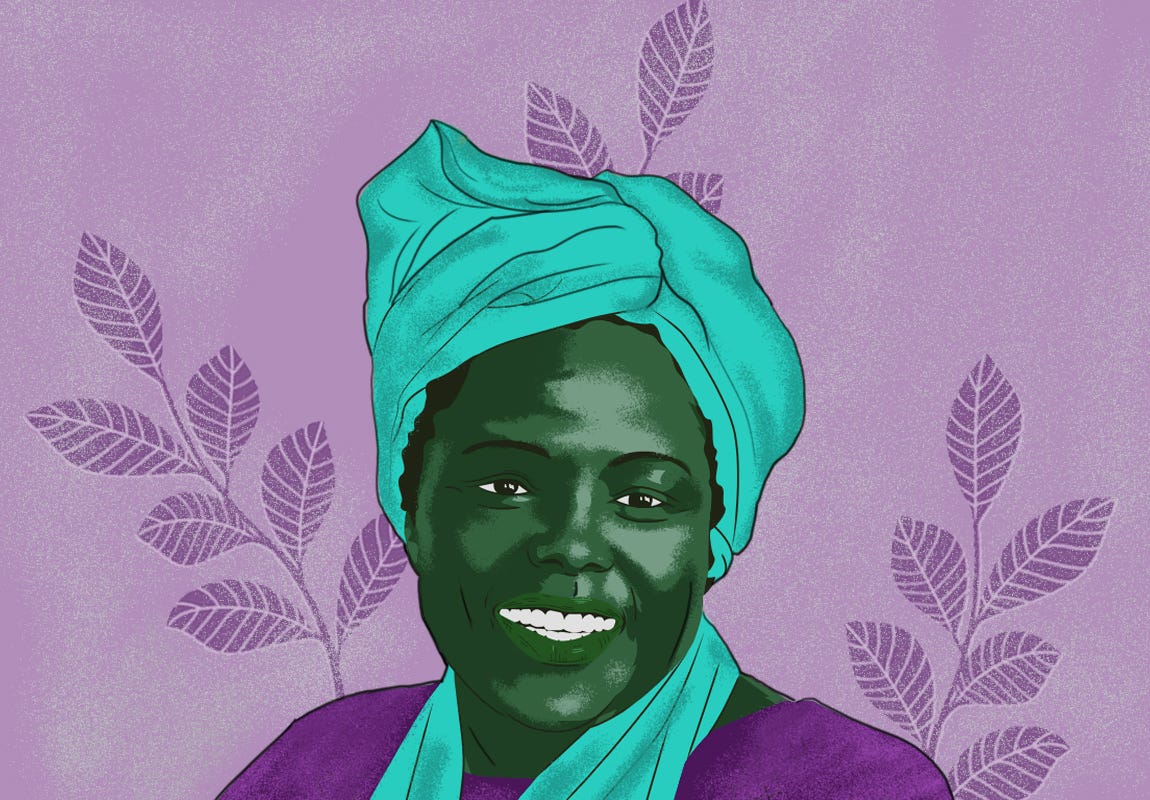Wangari Mathai: A pioneer of environmentalism and human rights
Wangari Mathai was a Kenyan environmental and political activist who became the first African woman to win the Nobel Prize.
Wangari Muta Mathai was born on April 1, 1940 in Nyeri, Kenya. She spent her childhood in the rural Kenyan countryside. She attended St. Cecilia Intermediary, a mission school for her primary education.
Mathai went to the United States for her higher education. In 1964, she obtained a degree in Biological Sciences from Mount St. Scholastica College in Atchison, Kansas. After graduation, she attended the University of Pittsburgh for her Master's and earned a Master of Science in 1966. She became the first woman in East Africa to earn a doctorate when she gained her PhD from the University of Nairobi in 1971, where she taught veterinary anatomy. In 1976, she became chair of the Department of Veterinary Anatomy, and in 1977, she was awarded the position of Associate Professor. She was the first woman to attain these positions in the East African region.
In June 1997, Wangari was chosen by Earth Times as one of the 100 individuals worldwide who have made a significant impact in the field of environmentalism.
Mathai started working with the National Council of Women of Kenya in 1976. During this time, Maathai came up with the concept that women in villages could enhance the environment by planting trees as a source of fuel and to counteract deforestation and desertification while working with the National Council of Women of Kenya. In 1977, she founded the Green Belt Movement, which successfully planted about 30 million trees by the early 21st century. The leaders of the Green Belt Movement formed the Pan African Green Belt Network in 1986 with the objective of educating global leaders about conservation and environmental improvement. Similar initiatives were launched in other African countries, such as Tanzania, Ethiopia, and Zimbabwe.
Apart from her efforts in environment conservation, Maathai actively promoted human rights, AIDS prevention, and women's rights, and she regularly raised these matters at the United Nations General Assembly meetings. She secured a seat in Kenya's National Assembly with a stunning 98 per cent of the vote in 2002. She was designated as the assistant minister of environment, natural resources, and wildlife in 2003.
In June 1997, Wangari was chosen by Earth Times as one of the 100 individuals worldwide who have made a significant impact in the field of environmentalism. In September 1998, she initiated the Jubilee 2000 Coalition campaign and took on fresh challenges, serving as a prominent global co-chair of the Jubilee 2000 Africa Campaign. This campaign was focused on cancelling the unmanageable debts of impoverished African countries by the year 2000.
Wangari Mathai won the Nobel Peace Prize in 2004. The award committee commended her "holistic approach to sustainable development that embraces democracy, human rights, and women's rights in particular." Her first book, The Green Belt Movement: Sharing the Approach and the Experience, detailed the history of the organisation. In 2007, she published her autobiography Unbowed.
Wangari Maathai was a globally renowned figure who tirelessly fought for democracy, human rights, and environmental preservation. She had delivered multiple speeches at the United Nations and represented women at special sessions of the General Assembly for the five-year review of the Earth Summit. Maathai was a member of the Commission for Global Governance and the Commission on the Future.
Wangari Mathai died on September 25, 2011, in Nairobi.


